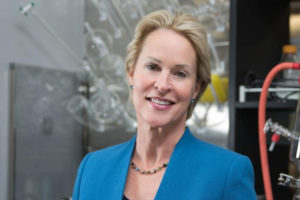 Frances Arnold, the Linus Pauling Professor of Chemical Engineering, Bioengineering, and Biotechnology at the California Institute of Technology, is one of the winners of this year’s Nobel Prize in Chemistry. She was a founding member of Berkeley Lab’s Biosciences Expert Advisory Committee, which was set up in 2013 to help develop a strategic plan for the Lab’s Biosciences Area. Arnold received her Ph.D. in chemical engineering from UC Berkeley under the auspices of Harvey Blanch, former Chief Science and Technology Officer of the Joint BioEnergy Institute. Following her thesis work, she was a postdoctoral scholar for about 18 months with the late UC Berkeley chemist and Biosciences affiliate Ignacio Tinoco, who researched the structure of RNA, or ribonucleic acid. Additionally, she has conducted experiments to solve the structure of engineered proteins at the Advanced Light Source and collaborated with researchers at the Molecular Foundry, both DOE Office of Science User Facilities at Berkeley Lab.
Frances Arnold, the Linus Pauling Professor of Chemical Engineering, Bioengineering, and Biotechnology at the California Institute of Technology, is one of the winners of this year’s Nobel Prize in Chemistry. She was a founding member of Berkeley Lab’s Biosciences Expert Advisory Committee, which was set up in 2013 to help develop a strategic plan for the Lab’s Biosciences Area. Arnold received her Ph.D. in chemical engineering from UC Berkeley under the auspices of Harvey Blanch, former Chief Science and Technology Officer of the Joint BioEnergy Institute. Following her thesis work, she was a postdoctoral scholar for about 18 months with the late UC Berkeley chemist and Biosciences affiliate Ignacio Tinoco, who researched the structure of RNA, or ribonucleic acid. Additionally, she has conducted experiments to solve the structure of engineered proteins at the Advanced Light Source and collaborated with researchers at the Molecular Foundry, both DOE Office of Science User Facilities at Berkeley Lab.
Arnold was awarded one half of this year’s prize for her work on directed evolution of enzymes, which are proteins that catalyze chemical reactions. Further, she refined the methods that are now routinely used to develop new catalysts. The uses of Frances Arnold’s enzymes include more environmentally friendly manufacturing of chemical substances, such as pharmaceuticals, and the production of renewable fuels. Read more about her affiliation with UC Berkeley in the Berkeley News Center.




